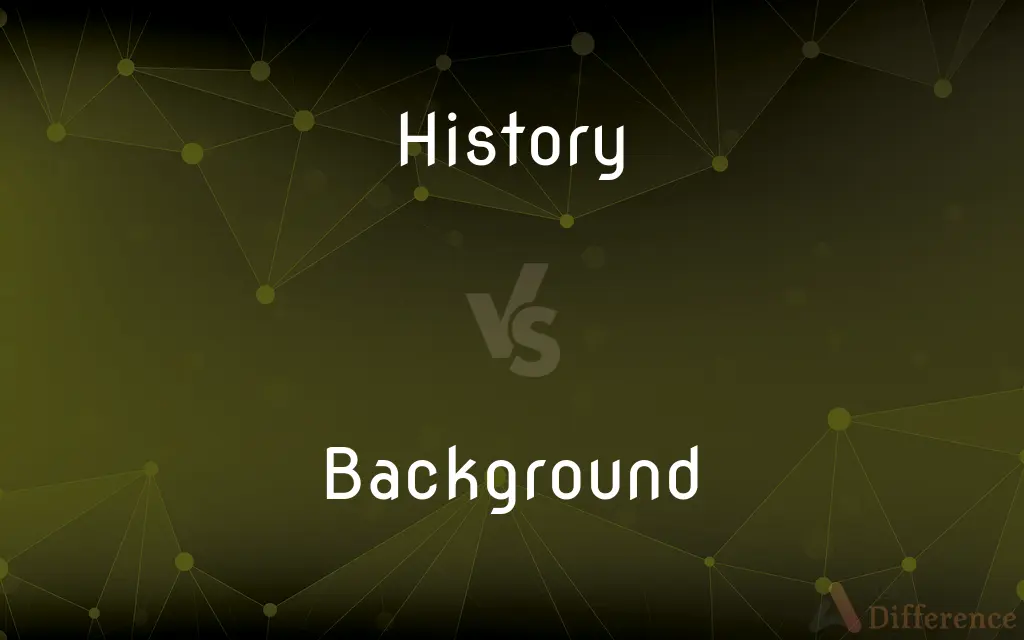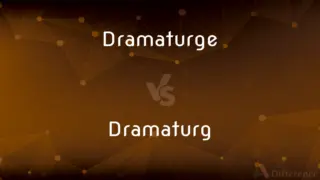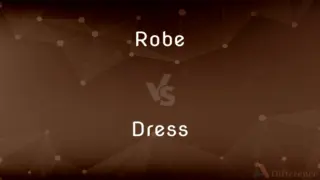History vs. Background — What's the Difference?
Edited by Tayyaba Rehman — By Urooj Arif — Updated on February 26, 2024
History refers to the study and record of past events, focusing on human activities over time, while background denotes information or circumstances that precede and provide context to a current situation or individual's life.

Difference Between History and Background
Table of Contents
ADVERTISEMENT
Key Differences
History is the systematic recording, analysis, and interpretation of past events, particularly those involving human actions. It encompasses a wide range of subjects, from politics to culture. Background, on the other hand, includes the specific details and influences leading up to an event or shaping a person's life, focusing on providing context rather than a comprehensive record.
The academic or professional settings, history often refers to a field of study dedicated to understanding how past events influence the present and future. Background, however, is used to describe the prior experiences, qualifications, and relevant information about a person or the circumstances leading to a specific event.
When discussing an individual, their history might include personal milestones, achievements, and experiences over their lifetime. In contrast, their background might focus on their education, family, and cultural influences that have shaped their personality and decisions.
The historical context of a subject provides a chronological account of relevant events and movements. The background information, however, offers specific details and factors that directly relate to the subject at hand, aiding in understanding its current state or condition.
Understanding history allows us to learn from past mistakes and successes, offering insights into human behavior and societal changes. Background information, while also informative, serves more to enrich our comprehension of a specific topic or individual by detailing the specific conditions and influences that led to the current scenario.
ADVERTISEMENT
Comparison Chart
Focus
Chronological events and human activities
Context and preconditions
Purpose
To learn and understand past to influence future
To provide context and understanding
Scope
Broad and comprehensive
Specific and detailed
Application
Academic study, general knowledge
Personal information, situational context
Relevance
Influences on present and future
Immediate context and influences
Compare with Definitions
History
The study of past events.
She majored in history to understand ancient civilizations.
Background
Personal history and qualifications.
Her background in engineering made her an ideal candidate.
History
Events affecting a particular area.
The island has a tumultuous history of piracy.
Background
Prior conditions or events.
The background of the crisis was complex and multifaceted.
History
A record of past events.
The history of the city was documented in the museum.
Background
Circumstances leading to a situation.
The detective considered the suspect's background in the investigation.
History
The aggregate of past events;
A critical time in the school's history
Background
Setting or situation's context.
Understanding the cultural background is crucial for negotiations.
History
A record or narrative description of past events;
A history of France
He gave an inaccurate account of the plot to kill the president
The story of exposure to lead
Background
Preceding information providing context.
The author provided a detailed background before discussing the theory.
History
Cumulative past of humanity.
The history of mankind is filled with both conflict and progress.
Background
Form a background to
Windswept land backgrounded by the Rockies
History
Personal experiences over time.
His history of volunteer work impressed the committee.
Background
Provide with background
The embassy backgrounded American reporters
History
The branch of knowledge that records and analyzes past events
"History has a long-range perspective" (Elizabeth Gurley Flynn).
Background
Anything behind, serving as a foil; as, the statue had a background of red hangings.
History
The past events relating to a particular thing
The history of their rivalry is full of intrigue.
History
The aggregate of past events or human affairs
Basic tools used throughout history.
History
Something that belongs to the past
Their troubles are history now.
History
A drama based on historical events
The histories of Shakespeare.
History
The aggregate of past events.
History repeats itself if we don’t learn from its mistakes.
History
The branch of knowledge that studies the past; the assessment of notable events.
He teaches history at the university.
History will not look kindly on these tyrants.
He dreams of an invention that will make history.
History
The portion of the past that is known and recorded by this field of study, as opposed to all earlier and unknown times that preceded it (prehistory).
In all of human history and prehistory
In all recorded history
History
The continuum of events occurring in succession leading from the past to the present and even into the future;
All of human history
History
The discipline that records and interprets past events involving human beings;
He teaches Medieval history
History takes the long view
History
All that is remembered of the past as preserved in writing; a body of knowledge;
The dawn of recorded history
From the beginning of history
Common Curiosities
How does one's background influence their perspective?
It shapes their views, beliefs, and responses based on personal experiences and cultural influences.
Why is background important in storytelling?
It provides context, enriches narratives, and helps audiences understand characters or situations.
How do personal history and background differ?
Personal history refers to an individual's past experiences over time, while background focuses on specific influences and qualifications.
Can background information include historical events?
Yes, when those events are directly relevant to understanding the current context or situation.
How can understanding the background help in problem-solving?
It offers insights into the root causes and conditions that led to the problem, aiding in finding effective solutions.
How do educators use history and background in teaching?
History is taught as a subject, while background information is used to provide context to lessons and topics.
Can background information change over time?
Yes, as new information emerges and perspectives shift, the understanding of background can evolve.
How does history differ from background in research?
History provides a chronological account of events, while background offers specific context and preconditions relevant to the research topic.
Is historical knowledge required to understand a person's background?
Not always, but historical context can enrich the understanding of factors that influenced a person's background.
Why is understanding history important?
It helps us learn from past actions, understand societal changes, and predict future trends.
How do historians and researchers use background information?
To provide context, support arguments, and enrich the understanding of their subjects.
Can the background be considered a part of history?
Yes, as it includes past conditions and influences that contribute to the current state.
Are history and background equally important in cultural studies?
Yes, both are crucial for a full understanding of cultural dynamics and influences.
Is there a hierarchy between history and background?
Not a hierarchy, but they serve different purposes: history for comprehensive understanding and background for contextual insight.
How do legal professionals use history and background?
History to understand legal precedents, and background for context in cases and judgments.
Share Your Discovery

Previous Comparison
Dramaturge vs. Dramaturg
Next Comparison
Robe vs. DressAuthor Spotlight
Written by
Urooj ArifUrooj is a skilled content writer at Ask Difference, known for her exceptional ability to simplify complex topics into engaging and informative content. With a passion for research and a flair for clear, concise writing, she consistently delivers articles that resonate with our diverse audience.
Edited by
Tayyaba RehmanTayyaba Rehman is a distinguished writer, currently serving as a primary contributor to askdifference.com. As a researcher in semantics and etymology, Tayyaba's passion for the complexity of languages and their distinctions has found a perfect home on the platform. Tayyaba delves into the intricacies of language, distinguishing between commonly confused words and phrases, thereby providing clarity for readers worldwide.















































